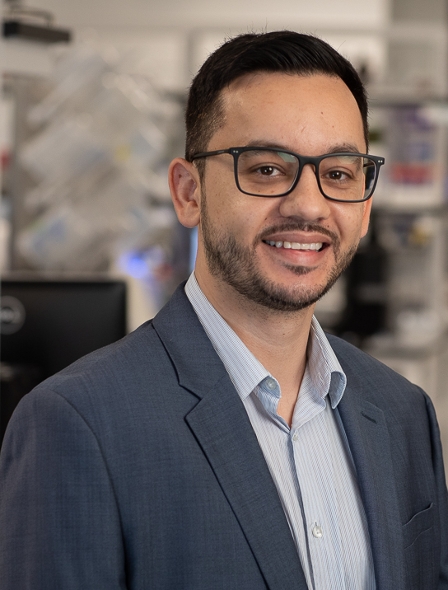
Louai Labanieh, PhD
About Me
Dr. Labanieh is an Assistant Professor in the Icahn Genomics Institute (IGI) and the Precision Immunology Institute (PrIISM) at Mount Sinai School of Medicine. As a bioengineer with expertise in synthetic biology, immunoengineering, and T-cell biology, Dr. Labanieh is developing next-generation high performance platform technologies to address the most pressing challenges for cell therapies for cancer. He developed SNIP-CAR, a drug-regulated CAR platform that enhances the safety and efficacy of CAR-T cells. The findings from his work credentialed this platform as best-in-class and laid the foundational preclinical studies to support a phase I clinical trial of the SNIP CAR platform in relapsed/refractory solid cancers at Stanford University School of Medicine. He has also developed technologies for drug-regulated control over cytokine signaling in engineered T-cells as well as a platform for purification of multi-engineered, sophisticated cell therapies. He has worked collaboratively to create logic-gated T-cells, injectable hydrogels for delivering cell therapies and cytokines, and technologies for imaging cell therapies in vivo. Dr. Labanieh is a co-inventor of 13 technologies spanning the fields of cell therapy, diagnostics, and high-throughput drug discovery. These technologies have been licensed to five biotechnology companies, including CARGO Therapeutics, a publicly traded and clinical stage CAR-T startup that Dr. Labanieh co-founded.
T cells genetically engineered to express chimeric antigen receptors (CAR-T) have shown remarkable clinical success against hematologic cancers. Such transformative clinical outcomes for patients with relapsed and refractory diseases have led to 15 FDA approvals to date. While these examples highlight the promise and curative potential of CAR-T cells, in practice, only a small fraction of cancer patients stand to benefit from this potentially life-saving therapy due to limitations in how these are generated for clinical use. CAR-T therapies are currently manufactured ex vivo: cells are harvested from a patient, genetically engineered in a lab using viral vectors to express the CAR transgene, expanded to large numbers, and reinfused back into the patient. Ex vivo manufacturing of CAR-T cells is hampered by prohibitively high costs, delayed manufacturing times, logistical challenges, loss of T cell functionality, and manufacturing failures.
In vivo engineering has the potential to bridge this critical gap by enabling cell therapies to be generated in situ via a gene delivery vector (e.g., lentivirus, mRNA, etc.) that can be directly infused into the patient. This approach would provide an off-the-shelf solution to expand patient access to these revolutionary therapies.
While proof-of-principle has been demonstrated for in vivo gene delivery of CAR therapies, these strategies are severely limited by: i) low delivery efficiency, ii) poor target cell specificity, iii) limited control over the biological functions of engineered cells, and iv) diminished efficacy owing to CAR-T cell dysfunction.
By working at the interface of synthetic biology, immunology, and cellular and genetic engineering, the Labanieh Lab will develop novel platform technologies for in vivo engineering and control of cell therapies. We aim to develop tools that allow for the precise genetic and functional manipulation of cells in vivo towards making safer and more effective therapies for cancer and beyond. We hope this work will help to establish a new paradigm for the deployment of broadly accessible cell and gene therapies.
Language
English
Position
ASSISTANT PROFESSOR | Immunology & Immunotherapy
Research Topics
Anti-Tumor Therapy, Autoimmunity, Biomechanics/Bioengineering, Breast Cancer, Cancer, Gene Therapy, Gene editing, Genetics, Immunology, Lymphocytes, Pediatrics, T Cells, Translational Research
Multi-Disciplinary Training Areas
Artificial Intelligence and Emerging Technologies in Medicine [AIET], Cancer Biology [CAB], Development Regeneration and Stem Cells [DRS], Disease Mechanisms and Therapeutics (DMT), Genetics and Genomic Sciences [GGS], Immunology [IMM]